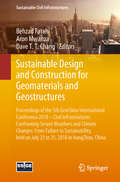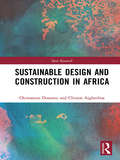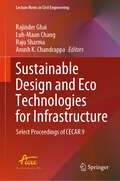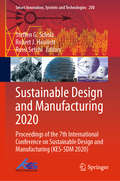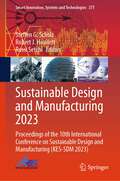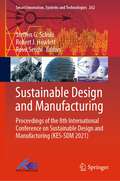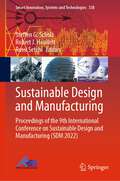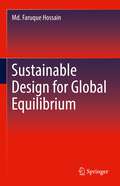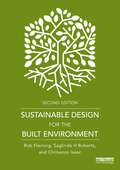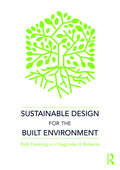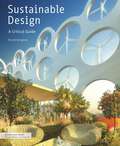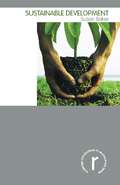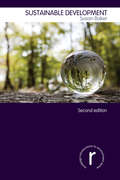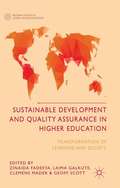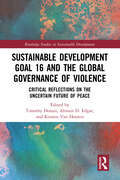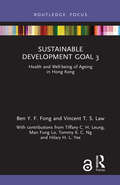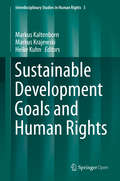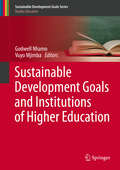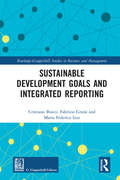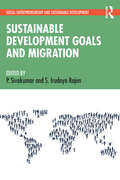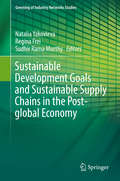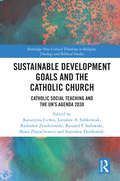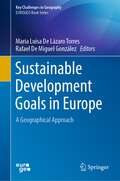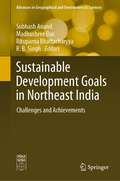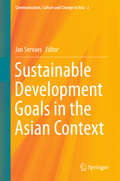- Table View
- List View
Sustainable Design and Construction for Geomaterials and Geostructures: Proceedings of the 5th GeoChina International Conference 2018 – Civil Infrastructures Confronting Severe Weathers and Climate Changes: From Failure to Sustainability, held on July 23 to 25, 2018 in HangZhou, China (Sustainable Civil Infrastructures)
by Behzad Fatahi Aron Mwanza Dave T.T. ChangThis book presents recent research findings and critically reviews the existing literature related to assessment of geotechnical structures under complex and extreme loading conditions such as cyclic, seismic and blast loads. Special emphasize is given to experimental assessment of behaviors of soils and rocks in tunneling , while advanced numerical modelling techniques are utilized for modelling and accurate predictions in emerging construction projects such as tunneling and embankments. The book is in line with current trends in civil engineering which are moving towards sustainable design and construction addressing the energy and material challenges. Papers were selected from the 5th GeoChina International Conference 2018 – Civil Infrastructures Confronting Severe Weathers and Climate Changes: From Failure to Sustainability, held on July 23 to 25, 2018 in HangZhou, China.
Sustainable Design and Construction in Africa: A System Dynamics Approach (Spon Research)
by Clinton Aigbavboa Oluwaseun DosumuThis book addresses some of the countless challenges faced by developing countries when adopting sustainable design and construction and offers suggestions for the way forward for African development projects. The authors argue that the pervasive non-consideration of the interrelationship between the elements of sustainable design and construction is the reason for the current failures in sustainable design and construction in developed countries. By treating sustainability as a complex system, the authors provide the missing link between the design and construction of projects in a sustainable way with a view to improving industry and project performance. In doing so the book posits the need for improved sustainability practice in developing countries, lessons for developing countries from the successes and failures of sustainability adoption by developed nations, factors influencing adoption of sustainability and effects of sustainable designs and construction on productivity, human health and the environment at large. This book will be of interest to construction researchers, practitioners, professional bodies, housing policy makers and government institutions as well as training and funding providers in these areas.
Sustainable Design and Eco Technologies for Infrastructure: Select Proceedings of CECAR 9 (Lecture Notes in Civil Engineering #441)
by Rajinder Ghai Luh-Maan Chang Raju Sharma Anush K. ChandrappaThis book presents the select proceedings of Civil Engineering Conference in the Asian Region (CECAR 9) hosted by the ICE (I) under the aegis of ACECC at Goa, India, from 21-23 September, 2022. It presents innovations and recent trends in civil engineering technologies, research and infrastructural developments and facilitates new ideas in the field of infrastructure design and construction. Various topics covered include innovative infrastructure, design practice and construction technology for sustainability, infrastructure development for smart and sustainable cities and affordable housing for developing economies, new construction materials and sustainability of infrastructure, geotechnical management, operation and safety, eco technology in pavement design and construction of roads and airport. This book will be useful for students, researchers and professionals working in the area of civil engineering.
Sustainable Design and Manufacturing 2020: Proceedings of the 7th International Conference on Sustainable Design and Manufacturing (KES-SDM 2020) (Smart Innovation, Systems and Technologies #200)
by Robert J. Howlett Rossi Setchi Steffen G. ScholzThis book consists of peer-reviewed papers, presented at the International Conference on Sustainable Design and Manufacturing (SDM 2020). Leading-edge research into sustainable design and manufacturing aims to enable the manufacturing industry to grow by adopting more advanced technologies and at the same time improve its sustainability by reducing its environmental impact. Relevant themes and topics include sustainable design, innovation and services; sustainable manufacturing processes and technology; sustainable manufacturing systems and enterprises; and decision support for sustainability. Application areas are wide and varied. The book provides an excellent overview of the latest developments in the sustainable design and manufacturing areas.
Sustainable Design and Manufacturing 2023: Proceedings of the 10th International Conference on Sustainable Design and Manufacturing (KES-SDM 2023) (Smart Innovation, Systems and Technologies #377)
by Robert J. Howlett Rossi Setchi Steffen G. ScholzThe book consists of peer-reviewed papers presented at the International Conference on Sustainable Design and Manufacturing (SDM 2023). Leading-edge research into sustainable design and manufacturing aims to enable the manufacturing industry to grow by adopting more advanced technologies and at the same time improve its sustainability by reducing its environmental impact. Relevant themes and topics include sustainable design, innovation and services; sustainable manufacturing processes and technology; sustainable manufacturing systems and enterprises; decision support for sustainability; and Industry 4.0 and Intelligent Manufacturing. Application areas are wide and varied. The book provides an excellent overview of the latest developments in the sustainable design and manufacturing area.
Sustainable Design and Manufacturing: Proceedings of the 8th International Conference on Sustainable Design and Manufacturing (KES-SDM 2021) (Smart Innovation, Systems and Technologies #262)
by Robert J. Howlett Rossi Setchi Steffen G. ScholzThis book consists of peer-reviewed papers, presented at the International Conference on Sustainable Design and Manufacturing (SDM 2021). Leading-edge research into sustainable design and manufacturing aims to enable the manufacturing industry to grow by adopting more advanced technologies and at the same time improve its sustainability by reducing its environmental impact. Relevant themes and topics include sustainable design, innovation and services; sustainable manufacturing processes and technology; sustainable manufacturing systems and enterprises; and decision support for sustainability. Application areas are wide and varied. The book will provide an excellent overview of the latest developments in the sustainable design and manufacturing area.
Sustainable Design and Manufacturing: Proceedings of the 9th International Conference on Sustainable Design and Manufacturing (SDM 2022) (Smart Innovation, Systems and Technologies #338)
by Robert J. Howlett Rossi Setchi Steffen G. ScholzThe book consists of peer-reviewed papers presented at the International Conference on Sustainable Design and Manufacturing (SDM 2022). Leading-edge research into sustainable design and manufacturing aims to enable the manufacturing industry to grow by adopting more advanced technologies and at the same time improve its sustainability by reducing its environmental impact. Relevant themes and topics include sustainable design, innovation and services; sustainable manufacturing processes and technology; sustainable manufacturing systems and enterprises; and decision support for sustainability. Application areas are wide and varied. The book provides an excellent overview of the latest developments in the sustainable design and manufacturing area.
Sustainable Design for Global Equilibrium
by Md. Faruque HossainThis book focuses on holistic approaches of applying sustainable practices in all sectors of building, infrastructure, and energy to achieve a best-balanced global energy, building, infrastructure, transportation, and water technology (EBITW) regime. It presents a series of solutions based on innovative research and applications for building a sustainable Earth for future generations. The goal of this book is to define the context of instigation for thinking through the scientific theories and practical applications of sustainability mechanisms to confirm a global equilibrium by the implementation of the following main practices: Sustainable Energy, Sustainable Architectural and Engineering Design Technology, Sustainable Environment and Society, and Sustainable Earth.
Sustainable Design for the Built Environment
by Rob Fleming Saglinda H Roberts Chitsanzo IsaacSustainable Design for the Built Environment marks the transition of sustainable design from a specialty service to the mainstream approach for creating a healthy and resilient built environment. This groundbreaking and transformative textbook introduces sustainable design in a clear, concise, easy-to-read format.This new edition includes fully updated exercises and online resources, an increased focus on diversity, equity, and inclusion in design, more international examples, perspectives, and approaches, enhanced full colour visuals, and additional resources for further study. The book takes the reader deep into the foundations of sustainable design, and creates a holistic and integrative approach addressing the social, cultural, ecological, and aesthetic aspects in addition to the typical performance-driven goals. The first section of this book is thematically structured around the origins, principles, and frameworks of sustainable design, aimed at inspiring a deeper, broader, and more inclusive view of sustainability. The second section examines strategies such as biophilia and biomimicry, adaptation and resilience, and health and well-being, including recent developments following the COVID-19 pandemic. The third section examines the application of sustainability principles from the global, urban, district and site, building, and human scales, illustrating how a systems thinking approach allows sustainable design to span varied contexts and multiple scales.This textbook is intended to inspire a new vision for the future that unites human activity with natural processes to form a regenerative, coevolutionary model for sustainable design. Supported by additional resources including additional reading for each chapter and classroom assignments, this book will be essential reading for students of sustainability and sustainable design.
Sustainable Design for the Built Environment
by Rob Fleming Saglinda H RobertsSustainable Design for the Built Environment marks the transition of sustainable design from a specialty service to the mainstream approach for creating a healthy and resilient built environment. This groundbreaking and transformative approach introduces sustainable design in a clear, concise, easy-to-read format. This book takes the reader deep into the foundations of sustainable design, and creates a holistic and integrative approach addressing the social, cultural, ecological, and aesthetic aspects in addition to the typical performance-driven goals. The first section of the book is themed around the origins, principles, and frameworks of sustainable design aimed at inspiring a deeper, broader, and more inclusive view of sustainability. The second section examines strategies such as biophilia and biomimicry, adaptation and resilience, health and well-being. The third section examines the application of sustainability principles from the global, urban, district, building, and human scale, illustrating how a systems thinking approach allows sustainable design to span the context of time, space, and varied perspectives. This textbook is intended to inspire a new vision for the future that unites human activity with natural processes to form a regenerative, coevolutionary model for sustainable design. By allowing the reader an insightful look into the history, motivations, and values of sustainable design, they begin to see sustainable design, not only as a way to deliver green buildings, but as a comprehensive and transformative meta-framework that is so needed in every sector of society. Supported by extensive online resources including videos and PowerPoints for each chapter, this book will be essential reading for students of sustainability and sustainable design.
Sustainable Design: A Critical Guide (Architecture Briefs)
by David BergmanWritten for students and practitioners in the fields of architecture and interior design, our new Architecture Brief Sustainable Design provides a concise overview of all the techniques available for reducing the energy footprint of structures and spaces. With clear, simple language and a practical "can-do" approach, author David Bergman covers everything from the profession's ethical responsibility, to design structures and spaces that sustain our natural resources, to specific considerations such as rainwater harvesting, graywater recycling, passive heating techniques, solar orientation, green roofs, wind energy, daylighting, indoor air quality, material evaluation and specification, and how to work with green building certification programs.
Sustainable Development
by Susan BakerThe promotion of sustainable development opens up the debates surrounding our relationship with the natural world, what constitutes social progress, and the character of development in the present and into the future. Answering the need for an introductory, comprehensive, yet critical book that explores the challenges involved in the implementation of sustainable development, this revealing text investigates this subject across different socio-political and economic contexts. It combines an examination of the institutional engagement with sustainable development at a global level, with an empirically informed discussion on challenges facing high consumption societies, economies in transition and third world countries in their efforts to achieve sustainable development. Recognizing that promoting sustainable development is a quintessentially global task, the book focuses on the authoritative Brundtland formulation of sustainable development and the role of the United Nations Summits in promoting this vision. The empirical focus of the book is complemented by strong conceptual discussions as sustainable development is explored as part of new efforts, albeit tentative, to integrate environmental, economic and (more recently) social considerations into a new development paradigm. Providing an accessible, up-to-date and comprehensive treatment of the issues surrounding the promotion of sustainable development, this unique, internationally-focused book combines a strong conceptual analysis, with wide ranging empirical focus and a wealth of case material. Including summary points and suggestions for further reading, as well as web resources and an extensive bibliography, it is ideal for students, scholars and researchers in the fields of environmental sciences, politics, sociology and development studies.
Sustainable Development (Routledge Introductions to Environment: Environment and Society Texts)
by Susan BakerThe current focus on sustainable development opens up debates surrounding our relationship with the natural world, about what constitutes social progress and about the character of development, both in the Global North and the Global South. The promotion of sustainable futures is taking on a new urgency in the context of climate change and biodiversity loss. This concise and accessible text explores how the international community is responding to the challenge of sustainable development. It also investigates the prospect for, and barriers to, the promotion of sustainable development in high-consumption societies of the industrialised world, from the USA and the EU to the economies of transition in Eastern and Southern Asia. In Sustainable Development Baker considers the global impact of China’s industrial boom as well as how Chinese investments are shaping the prospects for sustainable development on the African continent. This global coverage is balanced by investigating how local action, ranging from the transition towns movement in the UK to the Green Belt movement in Kenya, can contribute to the pursuit of sustainable development. The second edition has been extensively revised and updated and benefits from the addition of three new chapters: sustainable development in China; the governance of sustainable development; and sustainable production and consumption. Climate change and biodiversity management have also been expanded into full chapters. Providing an up-to-date and comprehensive treatment of the issues surrounding the promotion of sustainable development, this unique, internationally-focused book combines a strong conceptual analysis with wide ranging empirical focus and a wealth of case material. Including summary points and suggestions for further reading, as well as web resources and an extensive bibliography, it is ideal for students, scholars and researchers in the fields of environmental sciences, politics, geography, sociology and development studies.
Sustainable Development And Quality Assurance In Higher Education
by Zinaida Fadeeva Laima Galkute Clemens Mader Geoff ScottTo help address the challenges of sustainable development, higher education institutions must transform themselves, bringing together best practice in quality management for tertiary education with best practice in education for sustainable development. This book provides tested strategies and pathways for undertaking this successfully.
Sustainable Development Goal 16 and the Global Governance of Violence: Critical Reflections on the Uncertain Future of Peace (Routledge Studies in Sustainable Development)
by Timothy Donais Alistair D. Edgar Kirsten Van HoutenThis book brings together a diverse range of scholars and practitioners working at the nexus of peace and development to reflect, at the mid-way point of the Sustainable Development Goals implementation period, what impact Goal 16 has made, or may yet make, toward reducing violence in ‘all its forms.’ Adopted in 2015, the Sustainable Development Goals include 17 objectives designed to shape and direct the global development agenda through to 2030, with Goal 16 aiming to promote ‘peaceful and inclusive societies for sustainable development.’ Amidst an ongoing global pandemic, evidence of a fracturing liberal international order, and the persistence of seemingly intractable conflict in large parts of the world, this volume takes stock of current progress toward providing access to justice and ensuring inclusive and democratic institutions. Across 15 chapters, the book’s contributors explore the universal aspirations of Goal 16 and its specific implications for conflict-affected states, which continue to experience ‘development in reverse,’ and for historically marginalized groups such as women, youth, the disabled, and indigenous peoples. In doing so, it offers a comprehensive assessment of Goal 16’s broader contribution to the creation of a more just, peaceful world against the realities of societies emerging from the COVID-19 pandemic and grappling with a deepening climate crisis. This volume will appeal to scholars, researchers, policymakers, and postgraduate students in sustainable development, global governance, international relations, global development, international law, and political science.
Sustainable Development Goal 3: Health and Well-being of Ageing in Hong Kong (Routledge Focus on Public Governance in Asia)
by Ben Y. Fong Vincent T. LawSustainable Development Goals (SDGs) aim to develop a better and sustainable future for the world, and the goals are part of an action plan to address poverty, hunger, health, gender equity and various pressing world issues. One of these goals looks at health and wellness. Ageing populations have become a crucial issue worldwide, and this short monograph explores ageing and how the consequences of an ageing population may affect our healthcare system through a case study on Hong Kong’s population. The book looks at several critical health issues related to ageing. The elderly, particularly those with low socio-economic status, rely more on acute-centric care rather than primary care. The book suggests that secondary care service may only be effective to a limited extent as a healthcare measure and an optimum healthcare system should be one that focuses on primary care. The authors put forth a compelling argument for disease prevention and screening schemes and explain how they are more cost-effective and beneficial to society and the system. This thoughtful book will provide beneficial insights into the relationship of ageing and Sustainable Development Goals in the context of health and wellness for policymakers and healthcare professionals. The Open Access version of this book, available at http://www.taylorfrancis.com, has been made available under a Creative Commons Attribution-Non Commercial-No Derivatives 4.0 license.
Sustainable Development Goals and Human Rights (Interdisciplinary Studies in Human Rights #5)
by Markus Krajewski Markus Kaltenborn Heike KuhnThis open access book analyses the interplay of sustainable development and human rights from different perspectives including fight against poverty, health, gender equality, working conditions, climate change and the role of private actors. Each aspect is addressed from a more human rights-focused angle and a development-policy angle. This allows comparisons between the different approaches but also seeks to close gaps which would remain if only one perspective would be at the center of the discussions. Specifically, the book shows the strong connections between human rights and the objectives of the 2030 Agenda for Sustainable Development and the Sustainable Development Goals adopted by the United Nations in 2015. Already the preamble of this document explicitly states that “the 17 Sustainable Development Goals ... seek to realise the human rights of all”. Moreover, several goals and targets of the 2030 Agenda correspond to already existing individual human rights obligations. The contributions of this volume therefore also address how the implementation of human rights and SDGs can reinforce each other, but also point to critical shortcomings of the different approaches.
Sustainable Development Goals and Institutions of Higher Education (Sustainable Development Goals Series)
by Godwell Nhamo Vuyo MjimbaThis volume brings together both theoretical and case study based contributions to the implementation of the Sustainable Development Goals (SDGs) in Institutions of Higher Education (IHE), presenting an impactful combination of authors from both developing and developed countries. While most current publications addressing the SDGs and education focus on sustainable development in general and specific topics such as climate change or energy, this book attempts to accelerate the localisation of the SDGs by presenting opportunities and innovations offered in various universities and campuses regarding SDGs localisation. The book seeks to provide an important contribution to the global dialogue on IHE and the SDGs, and will be of interest to academics and researchers engaged in the SDGs and education, as well as government agencies and other interested stakeholders. The book focuses on curriculum and learning matters, research and development as well as community engagement. Case studies detail the integration of SDGs in academic and professional development, new approaches to implementing sustainability science instruction, improvements in teaching practices to enhance teacher competence, and responsible management education. Additional focus is placed on the alignment of the SDGs in higher education with the other goals, emphasizing technological innovation for improved human health and environmental management, and climate change policies and action plans. Interdisciplinary solutions for pressing environmental problems are also provided, making sure that no one is left behind in realising these global development goals.
Sustainable Development Goals and Integrated Reporting (Routledge-Giappichelli Studies in Business and Management)
by Cristiano Busco Fabrizio Granà Maria Federica IzzoOur planet faces massive economic, social, and environmental challenges. To deal with these challenges, the United Nations has promoted 17 Sustainable Development Goals (SDGs) to define global priorities and aspirations for 2030, and Governments worldwide have already agreed on these goals. In order to approach them practically, private and public organizations have to contribute to make SDGs happen by identifying and executing sustainable strategies as key drivers of their visions and business models. Building on the emerging concept of Integrated Thinking (IT), this book explores how modern organizations can leverage a long-term integrated strategy to reconcile financial stability with social and environmental sustainability and create enduring value for all stakeholders. By focusing on the value-creating role of business organizations in delivering on the promise of sustainable and inclusive development, the book enriches the debate on Integrated Thinking and Integrated Reporting (IR), with particular emphasis on the value creation process. This book offers an opportunity to discuss the way in which business organisations can rethink their management processes, accounting tools and reporting solutions, as they strive for both competitiveness and growth while contributing to the achievement of the SDGs, and long-term value creation more broadly. Based on the analysis of different case studies, the book explores how organizations are approaching these challenges and how they are connecting SDGs, to business models and strategies. Analysing the impact of SDGs on materiality, connectivity, and stakeholder engagement, this book provides an insight into how Integrated Thinking, Management and Reporting is currently practiced and in which way these managerial innovations can contribute to SDGs.
Sustainable Development Goals and Migration (Towards Sustainable Futures)
by P. Sivakumar S. Irudaya RajanThis book looks at migration in contemporary society and its interrelations with development. It presents the complexities and dilemmas associated with migration, the changes in theoretical and historical perspectives on migration and development, and the role of policies and the sustainable development goals in this context. The volume views migration as a phenomenon for advancing human development outcomes. It deals with wide-ranging issues including labour migration, the idea of decent work, migration and transnationalism, remittances, social networks and capital, and addressing poverty. The chapters highlight the focus of the Sustainable Development Goals (SDGs) and its relevance on migrant rights, safeguarding livelihoods and health. They also offer insights into regional and international co-operation on policies for migration, social growth and protection, and citizenship. With comparative analyses of data, trends and development indicators as well as various case studies, this volume examines the impact of migration on international relations and politics, labour market outcomes, gender, youth and education among others. It also discusses the loss of lives and livelihoods due to the Covid-19 pandemic, its impact on migration and the effects of the pandemic on the contemporary discussions on migration and SDGs. Rich in empirical data, this book will be an excellent read for scholars and researchers of migration and diaspora studies, development studies, refugee studies, public policy and governance, international relations, political studies, political economy, sociology and South Asian Studies.
Sustainable Development Goals and Sustainable Supply Chains in the Post-global Economy (Greening of Industry Networks Studies #7)
by Natalia Yakovleva Regina Frei Sudhir Rama MurthyThis book presents a collection of studies on current best practices for delivering sustainable development policies within supply chains. It critiques the limitations of existing business theory and practice on sustainable supply chain management, and discusses opportunities for new conceptual models for businesses to engage with Sustainable Development Goals (SDGs). It examines how businesses can work towards implementing Sustainable Development Goals in the contexts of entrepreneurial initiative, industry collaboration and regional development. SDGs renew the sustainable development agenda for global communities and ask businesses and organisations to reset their sustainable development policies. A strategy to embed sustainable development principles into business operations along the supply chain operations, which has been a conceptual and, in many instances, practitioner, business and industry achievement of the past decades, is not enough to shift the economic and social conditions of poor populations around the world. How would the global supply chains of the future look like? What social relations does it envisage? How will businesses and organisations engage with societies, environments and complex institutional contexts in emerging markets and developing countries, which are faced with issues of population growth, needed leaps in infrastructure provision, educational and health improvements, cultural and institutional shifts? The books challenges current approaches to sustainable supply chain practices guided by discussion on SDGs. It reviews implementation issues of existing sustainable development approaches, assesses the advancement of sustainable development strategies and examines the opportunities for global value chains to increase their positive social and environmental inputs in regions, communities and organisations. The book collects both conceptual and empirical studies set in a variety of business and organisational contexts, such as manufacturing, retail, procurement, cities and industrial parks. It contests the accepted axioms of sustainable practices in the global supply chains and proposes new models for organisations and production networks to engage with societies and address market and production effects on communities and institutions.
Sustainable Development Goals and the Catholic Church: Catholic Social Teaching and the UN’s Agenda 2030 (Routledge New Critical Thinking in Religion, Theology and Biblical Studies)
by Ski Katarzyna Cichos Stanis 322 Jaros 322 Aw A. Sobkowiak Ryszard F. Sadowski Beata Zbarachewicz Rados 322 Aw Zenderowski Aw Dzieko 324This book identifies both the consistencies and disparities between Catholic Social Teaching and the United Nation’s (UN) Sustainable Development Goals (SDGs). With Pope Francis’ Laudato si’ encyclical, Catholicism seems to be engaging more than ever with environmental and developmental concerns. However, there remains the question of how these theological statements will be put into practice. The ongoing involvement of the Catholic Church in social matters makes it a significant potential partner in issues around development. Therefore, with the use of the comparative method, this book brings together authors from multiple disciplines to assess how the political and legal aspects of each of the UN’s 17 SDGs are addressed by Catholic Social Teaching. Chapters answer the question of how the Catholic Church evaluates the concept of sustainable development as defined by the Agenda 2030 Goals, as well as assessing how and if it can contribute to shaping the contemporary concept of global development. Examining the potential level of cooperation between the international community and the Catholic Church in the implementation of the Agenda 2030 Goals, this volume will be of keen interest to scholars of Catholic Studies, Religious Studies and the Sociology of Religion, as well as Environmental Studies and Development Studies.
Sustainable Development Goals in Europe: A Geographical Approach (Key Challenges in Geography)
by María Luisa De Lázaro Torres Rafael De Miguel GonzálezThe aim of this book is to provide a synthesis of the newest research in Geography concerning the Sustainable Development Goals (SDG’s). Although the world is strongly interconnected, the majority of the chapters in this volume focus on Europe or the work of European researchers. Each chapter of this book focusses on one of the 17 SDG’s providing in-depth knowledge from a geographical perspective, fostering comprehensive research on these global targets to end poverty, fight inequality and injustice, and tackle climate change.The Sustainable Development Goals are part of the 2030 Agenda for Sustainable Development. To achieve them, it will be necessary for all stakeholders, including citizens (civil society, doctors, teachers), governments, private sector to collaborate.
Sustainable Development Goals in Northeast India: Challenges and Achievements (Advances in Geographical and Environmental Sciences)
by R. B. Singh Subhash Anand Rituparna Bhattacharyya Madhushree DasThis book covers themes related to the geosphere, biosphere, sociosphere and ecosphere dealing with changing geographical, environmental and socio-economic realities to plan a sustainable future for the northeast region (NER) of India. The NER consists of eight states—Assam, Arunachal Pradesh, Tripura, Nagaland, Manipur, Mizoram, Meghalaya and Sikkim—and they carry political, economic and social importance. The book integrates the past, present and future of geospheric attributes incorporating progress towards the Sustainable Development Goals (SDGs) to meet the demands for improving human wellbeing under diverse and challenging socio-economic, political and environmental conditions. The key SDGs, as in food and agriculture, health, education, water, energy and other overarching goals of the region, have yet to incorporate providing sustainable jobs and promoting equality and inclusive development, although there have been a few studies in that regard.The challenges to achieve SDGs in the NER are formidable compared to the rest of India. The NER has put a great deal of effort into achieving the SDGs, mainly in poverty (SDG-1), good health (SDG-3), education (SDG-4), gender (SDG-5), decent work (SDG-8) and reduced inequalities (SDG-10), similar to the rest of the country. However, the standard development indicators such as road length, access to health care, power consumption and other measures are far below the national average. A multi-pronged strategy has played a pivotal role in the region, but development strategy to attain the SDGs 2030 must be more inclusive in empowering people with maximising self-governance, considering the resources, needs and aspirations of the people.This book evaluates the performance of the SDGs and fills in the gaps. It includes case studies focusing on different SDGs using advanced cartographic, statistical and GIS techniques and methods. It also provides unique findings that serve as valuable resources for planners and policy-makers so that a sustainable future in Northeast India can be achieved.
Sustainable Development Goals in the Asian Context
by Jan ServaesThis book presents research that focuses on Sustainable Development in Asia. Chapters are extended works of papers presented at Communication/Culture and The Sustainable Development Goals (CCSDG): Challenges for a New Generation, an international conference held in Chiang Mai University in December 2015. The chapters address assessments of Millennium Development Goals in several Asian countries and the region as a whole. The book also identifies and discusses the changes and potential improvements in the transition from Millennium Development Goals (2000-2015) to Sustainable Development Goals (2015-2030). Areas that are covered in the book, which are illustrated with case studies, include Corporate Social Accountability, Information and Communications Technologies, and Small Medium Enterprises (SMEs). The book serves as a useful resource for academics, scholars, students, and policymakers, interested in Development Studies.
